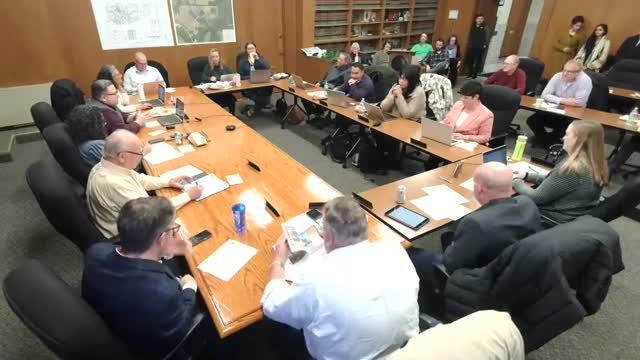Moline City council debates demolition-delay rules for buildings 50 years and older
Get AI-powered insights, summaries, and transcripts
Subscribe
Summary
Moline City Council members spent an extended session discussing a proposed change to Chapter 8 of the Moline City Code that would allow the city to withhold demolition permits for principal structures at least 50 years old so staff and the Historic Preservation Commission can document, salvage or pursue landmarking options before demolition proceeds.
Moline City Council members spent an extended session discussing a proposed change to Chapter 8 of the Moline City Code that would allow the city to withhold demolition permits for principal structures at least 50 years old so staff and the Historic Preservation Commission can document, salvage or pursue landmarking options before demolition proceeds.
The change on the table would “allow for demolition permits to be reviewed and possibly delayed for up to 90 days if you look at the total, but it's it's 30 days with a possible extension of 60 more days,” a council member presenting the proposal told the chamber. The presenter said the intent is to create time for research, documentation and removal of historic artifacts and to give a window for potential landmarking.
Historic Preservation Commission members urged stronger formal involvement. Barb Sandberg, a member of the Historic Preservation Commission, told the council the commission’s work is to “identify such structures, places or areas within the city which are historically significant” and urged that the commission be a formal referral in the review process. “We're not here to stop a demolition,” Sandberg said, “we're merely wanting to see what is there that is salvageable.”
Supporters of formal commission involvement argued the commission has the institutional knowledge and research access — including the local historic library — to complete evaluations swiftly. Staff and some councilors countered that final approval authority should rest with the city’s Community and Economic Development director due to liability and timeline concerns. A city staff member said the director would be liable for delays and any litigation arising from such holds, and noted the practical limits on staff capacity.
Under the version the administration brought forward, the proposed process would include an initial five-business-day window for review, an automatic 30-day hold, and a possible 60-day extension (the total commonly described as 90 days). The draft before the council would apply only to principal structures 50 years or older; accessory buildings such as garages were removed from the proposal. The draft also included exceptions for public-safety emergencies and an economic-exemption process where owners could apply to council for relief. Staff noted the ordinance could also be coordinated into development agreements so developers would know in advance about possible holds.
Councilors and commission members debated the total hold length. Several council members said they were uncomfortable with an up-to-90-day delay. One councilor said he had been “comfortable” with a maximum of about 45 days in prior discussions; others suggested a compromise beginning point of 50 days. Council discussion also raised whether the required collaboration and procedure should be codified in ordinance language, included in commission bylaws, or established in an administrative policy that would be approved by council but not part of the code.
Rather than taking a formal vote, the council directed staff to return with written options: a policy and an ordinance draft that incorporate clearer procedures for Historic Preservation Commission involvement and a shorter hold period (council discussion suggested 50 days as a starting point). Staff said it would work to write specific procedures that require cooperation between the Community and Economic Development director and the Historic Preservation Commission and would bring those proposals back for council consideration.
Next steps include staff drafting a policy and an ordinance revision that: (1) sets a defined review timeline and procedures for HPC involvement; (2) keeps emergency and economic exemptions; and (3) identifies how the rule would be coordinated with development review. The Community and Economic Development director and staff member Sean Foley were identified as the staff leads for returning language to the council.
